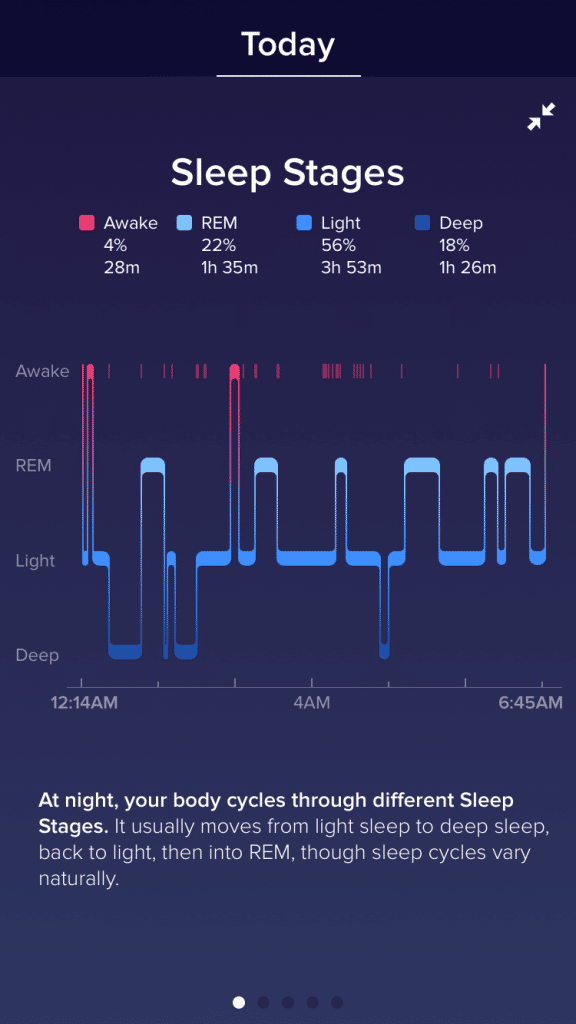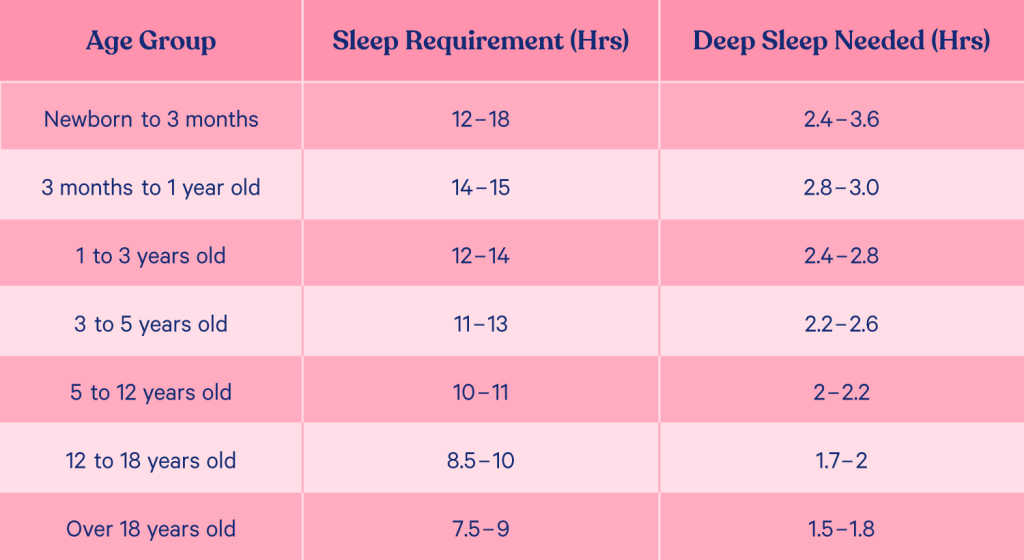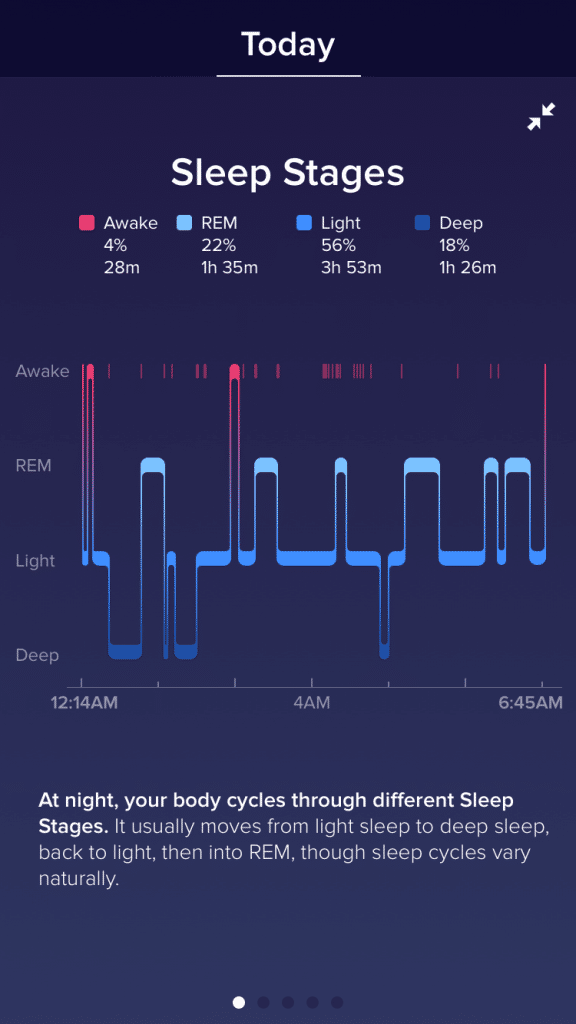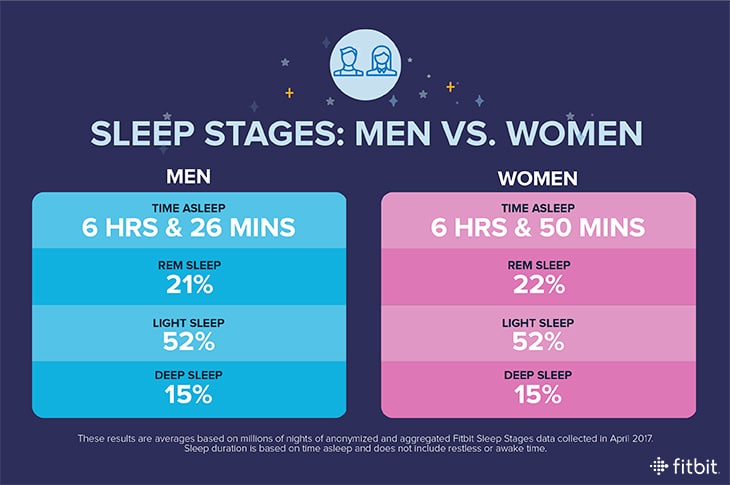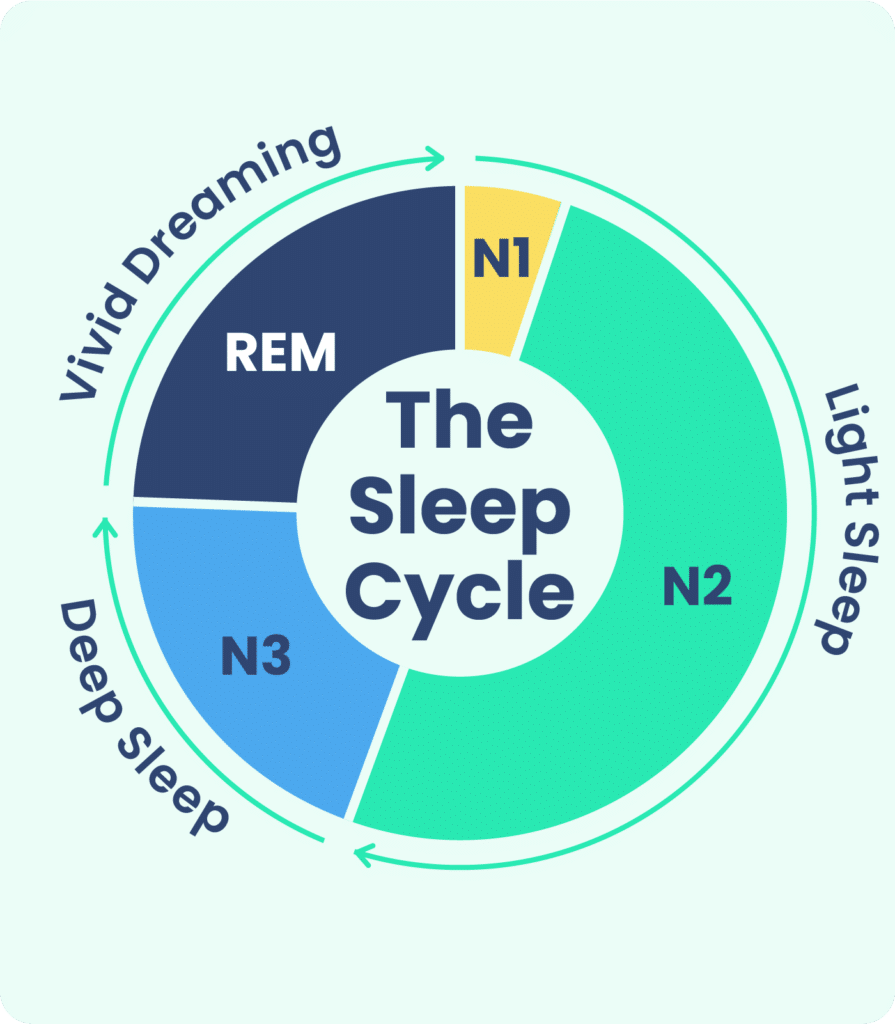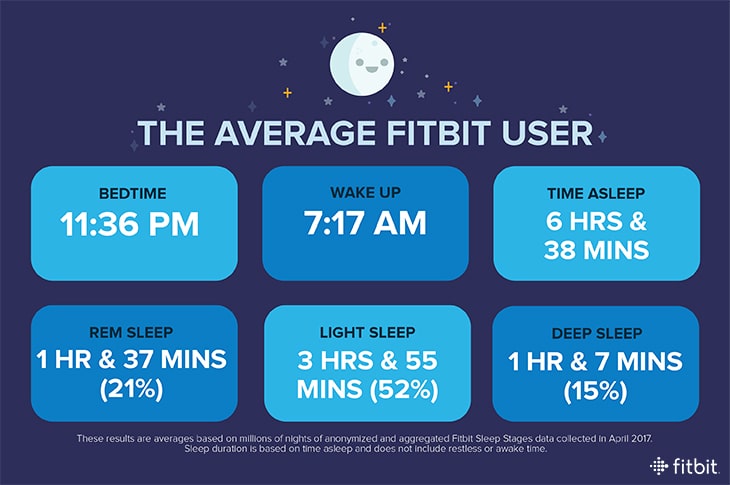We all know how important it is to get a good night’s sleep, but have you ever wondered just how much deep sleep you should be aiming for? Deep sleep, also known as slow-wave sleep, is the stage in our sleep cycle where our brain waves slow down, our body relaxes, and our muscles repair and recover. It is during this phase that our body experiences the most restorative effects of sleep, leaving us feeling refreshed and rejuvenated in the morning. But how much deep sleep do we actually need to reap these benefits? In this article, we will explore the optimal amount of deep sleep you should be aiming for each night, and how to achieve it for a truly restful slumber.
This image is property of images.ctfassets.net.
Review contents
Understanding deep sleep
Definition of deep sleep
Deep sleep, also known as slow-wave sleep, is a crucial stage of the sleep cycle characterized by synchronized brain activity and slow delta waves. It is the period when the body and mind undergo essential restorative processes, aiding in physical and mental rejuvenation.
Importance of deep sleep
Deep sleep plays a vital role in various aspects of our overall health and well-being. It is during this stage that the body repairs tissues, strengthens the immune system, and supports growth and development. Moreover, deep sleep is associated with memory consolidation, learning retention, and emotional regulation.
Stages of sleep
To understand deep sleep better, it’s essential to grasp the overall structure of sleep cycles. Sleep is typically divided into four stages: N1, N2, N3 (deep sleep), and REM (rapid eye movement) sleep. The sleep cycle comprises multiple cycles of these stages, lasting around 90 to 110 minutes each. Deep sleep occurs primarily during the first half of the night, while REM sleep becomes more prominent in the latter half.
Deep sleep duration
The duration of deep sleep varies from person to person. On average, adults spend approximately 20-25% of their total sleep time in deep sleep. However, this percentage decreases with age, as deep sleep becomes less prominent. It is important to note that achieving adequate deep sleep duration is crucial for reaping its benefits.
Factors affecting deep sleep
Age
As we age, the amount of deep sleep we experience naturally decreases. Newborns spend about 40-50% of their sleep in deep sleep, while older adults may only have 5-10% deep sleep. This age-related decline is attributed to changes in brain function and hormone production.
Gender
Research has shown that biological differences between genders can influence deep sleep duration and quality. Generally, women tend to spend slightly more time in deep sleep compared to men. However, hormonal fluctuations throughout the menstrual cycle can affect women’s deep sleep patterns.
Physical activity
Engaging in regular physical activity has been found to positively impact deep sleep. Exercise promotes the secretion of growth hormone, which is involved in deep sleep regulation. However, strenuous exercise close to bedtime may have a stimulating effect and disrupt sleep patterns. It is advisable to allow sufficient time for the body to cool down before sleep.
Diet and caffeine intake
The foods we consume and our caffeine intake can significantly affect sleep quality, including deep sleep. Heavy meals close to bedtime, especially those high in fat and protein, can interfere with sleep. Caffeine, a stimulant found in coffee, tea, and certain medications, can disrupt deep sleep by blocking adenosine receptors, a neurotransmitter involved in sleep regulation.
Stress and anxiety
Psychological factors such as stress and anxiety can impact the duration and quality of deep sleep. The body’s stress response can trigger the release of stress hormones like cortisol, inhibiting the transition to deep sleep. Mental relaxation techniques and stress management strategies can help alleviate these effects and promote better deep sleep.
Medical conditions and medications
Certain medical conditions, such as sleep disorders, chronic pain, and respiratory problems, can interfere with deep sleep. Additionally, medications such as antidepressants, beta-blockers, and corticosteroids may affect sleep architecture and disrupt deep sleep patterns. It is important to discuss any concerns with a healthcare professional to address underlying medical issues or adjust medication regimes if necessary.
Recommended deep sleep duration
National Sleep Foundation recommendations
The National Sleep Foundation suggests that adults between the ages of 18 and 64 aim for 7-9 hours of quality sleep per night. While these recommendations do not specifically outline deep sleep duration, obtaining the recommended amount of total sleep contributes to achieving an adequate deep sleep stage.
Age-specific recommendations
The recommended deep sleep duration varies across different age groups. Infants generally require the most deep sleep, needing around 12-15 hours per day. Children and teenagers should aim for 9-11 hours, while adults should strive for 7-9 hours. Although older adults tend to experience less deep sleep, they still need around 7-8 hours of quality sleep.
Quality over quantity
While the duration of deep sleep is important, focusing solely on quantity can undermine the significance of quality sleep. It is possible to spend the recommended amount of time in bed but still experience fragmented or poor-quality deep sleep. Prioritizing relaxation, sleep hygiene, and consistent sleep schedules can significantly improve the quality of deep sleep obtained.
Individual variations
Individual variations in deep sleep requirements should also be considered. While general recommendations exist, each person’s sleep needs may differ based on factors such as genetics, lifestyle, and overall health. It is essential to pay attention to personal sleep patterns and adjust sleep routines accordingly to optimize deep sleep duration.
Consequences of inadequate deep sleep
Impact on cognitive function
Insufficient deep sleep can significantly impact cognitive function and performance. It can impair memory consolidation, learning, and problem-solving abilities. Lack of deep sleep may also lead to difficulties with concentration, attention, and decision-making skills.
Effects on physical health
The body relies on deep sleep for various physical restorative processes. Failure to obtain enough deep sleep has been linked to an increased risk of cardiovascular diseases, obesity, diabetes, and hypertension. Additionally, inadequate deep sleep can affect hormone regulation, leading to appetite dysregulation and increased hunger levels.
Mood and emotional well-being
Deep sleep deprivation can negatively affect mood and emotional well-being. It can contribute to heightened stress levels, irritability, and a greater susceptibility to mood disorders such as depression and anxiety. Conversely, improved deep sleep can enhance emotional resilience and promote overall mental wellness.
Immune system function
Deep sleep plays a crucial role in supporting immune system function. During this stage, the body produces immune cells and releases cytokines, which help protect against infections and inflammation. Lack of deep sleep can weaken the immune system, making individuals more prone to illnesses and infections.
Increased risk of chronic conditions
Chronic sleep deprivation, including inadequate deep sleep, has been associated with an increased risk of developing chronic conditions such as cardiovascular diseases, diabetes, obesity, and certain cancers. Prioritizing deep sleep is essential for maintaining long-term health and reducing the risk of these conditions.
This image is property of blog.fitbit.com.
Tips for improving deep sleep
Establish a consistent sleep schedule
Maintaining a regular sleep schedule helps regulate the body’s internal clock and promotes deeper, more restorative sleep. Aim to go to bed and wake up at the same time every day, even on weekends.
Create a conducive sleep environment
Ensure your sleep environment is comfortable, quiet, and dark. Consider investing in a supportive mattress and pillows, and use blackout curtains or an eye mask to block out unwanted light. Keeping the bedroom temperature cool can also contribute to better deep sleep.
Practice relaxation techniques
Engaging in relaxation techniques before bed can help prepare the mind and body for sleep. Options include deep breathing exercises, meditation, progressive muscle relaxation, and aromatherapy. Find a routine that works for you and incorporate it into your evening wind-down routine.
Regular exercise
Regular exercise has been shown to improve sleep quality, including deep sleep. Aim for at least 150 minutes of moderate-intensity aerobic activity or 75 minutes of vigorous activity each week. However, refrain from exercising vigorously close to bedtime, as it can be stimulating and affect sleep.
Limit caffeine and alcohol consumption
Caffeine and alcohol can negatively impact sleep, including deep sleep. Avoid consuming caffeine in the late afternoon or evening, as it can interfere with sleep onset. While alcohol may initially make you sleepy, it disrupts sleep later in the night, preventing deep sleep stages from occurring.
Manage stress levels
Stress and anxiety can interfere with deep sleep. Prioritize stress management techniques such as journaling, practicing mindfulness, engaging in hobbies, or seeking professional help if needed. Developing healthy coping mechanisms can help reduce stress and promote better sleep.
Tracking and measuring deep sleep
Sleep tracking devices
Sleep tracking devices, such as smartwatches or fitness trackers, can provide valuable insights into sleep patterns, including deep sleep. These devices typically use accelerometers or heart rate monitors to estimate sleep stages. While helpful, it is important to interpret the data cautiously, as they may not always be perfectly accurate.
Polysomnography
Polysomnography is a diagnostic test performed in sleep laboratories that monitors various physiological parameters during sleep. This comprehensive assessment provides detailed information about sleep stages, breathing patterns, brain waves, and other factors influencing sleep quality, including deep sleep.
Interpreting sleep data
When evaluating sleep data, pay attention to the duration and quality of deep sleep obtained. Comparing trends over time can help identify factors that improve or hinder deep sleep. However, it is important to remember that the interpretation of sleep data should be done in consultation with a healthcare professional.
Seeking professional help
If you consistently experience difficulties with deep sleep or suspect a sleep disorder, it is advisable to seek professional help. Sleep specialists can conduct in-depth evaluations, provide accurate diagnoses, and recommend personalized treatment plans to address underlying issues and improve deep sleep quality.
This image is property of blog.fitbit.com.
Common sleep disorders affecting deep sleep
Insomnia
Insomnia is a sleep disorder characterized by difficulty falling asleep, staying asleep, or experiencing non-restorative sleep. It can significantly disrupt deep sleep, leading to daytime fatigue, impaired cognitive function, and mood disturbances.
Sleep apnea
Sleep apnea is a condition where breathing is repeatedly disrupted during sleep, resulting in frequent awakenings. This interruption in breathing can prevent individuals from entering or maintaining deep sleep stages, leading to excessive daytime sleepiness, snoring, and other health complications.
Restless leg syndrome
Restless leg syndrome causes uncomfortable sensations in the legs, often accompanied by an irresistible urge to move them. The discomfort can disrupt sleep, making it challenging to achieve and maintain deep sleep.
Narcolepsy
Narcolepsy is a neurological disorder characterized by excessive daytime sleepiness, sudden and uncontrollable sleep attacks, and disrupted sleep-wake cycles. Individuals with narcolepsy often experience disruptions in deep sleep, leading to fragmented sleep and daytime fatigue.
Parasomnias
Parasomnias are a group of sleep disorders that involve abnormal behaviors or experiences during sleep. These can include sleepwalking, night terrors, or sleep-eating disorders. Parasomnias can disrupt deep sleep, leading to poor sleep quality and daytime drowsiness.
Lifestyle changes to promote deep sleep
Maintaining a healthy sleep routine
Establishing a consistent sleep routine can help regulate the sleep-wake cycle and promote deep sleep. Prioritize regular bedtimes and wake-up times, even on weekends, to maintain a consistent sleep schedule.
Avoiding stimulating activities before bed
Engaging in stimulating activities before bedtime, such as intense exercise, electronic device usage, or stressful tasks, can hinder deep sleep. It is advisable to unwind with calming activities like reading, taking a warm bath, or practicing relaxation techniques.
Creating a comfortable sleep environment
Ensure that your sleep environment is conducive to deep sleep. Keep your bedroom cool, quiet, and dark. Consider investing in a comfortable mattress, supportive pillows, and blackout curtains, if needed.
Considering sleep aids as a last resort
While lifestyle changes are often effective in promoting deep sleep, some individuals may require additional support. Sleep aids should be considered as a last resort and taken under the guidance of a healthcare professional. They can provide temporary relief but should not be relied upon as a long-term solution.
This image is property of www.sleepfoundation.org.
When to seek medical advice
Persistent sleep disturbances
If you consistently experience difficulties falling asleep or maintaining sleep, and these issues persist for more than a few weeks, it is advisable to seek medical advice. These persistent sleep disturbances might be indicative of an underlying sleep disorder or other medical conditions.
Excessive daytime sleepiness
Excessive daytime sleepiness, despite obtaining sufficient sleep, can be a sign of poor deep sleep quality or a sleep disorder. If you consistently struggle to stay awake during the day or experience sudden sleep attacks, it is important to seek medical advice.
Chronic fatigue
If you consistently feel excessively tired, lack energy, and experience impaired cognitive function, despite obtaining adequate sleep, it may be necessary to consult a healthcare professional. Chronic fatigue can result from various underlying health conditions, including those that affect deep sleep.
Concerns about sleep quality
If you have concerns about the quality of your deep sleep or overall sleep patterns, it is beneficial to seek advice from a healthcare professional. They can evaluate your sleep habits, provide guidance, and conduct further assessments if necessary.
Impact on daily functioning
If inadequate deep sleep and poor sleep quality significantly impact your daily functioning, work productivity, relationships, or overall well-being, it is vital to seek medical advice. Addressing underlying sleep issues can improve overall quality of life.
Conclusion
Understanding the importance of deep sleep is crucial for optimizing our overall health and well-being. It is during this restorative stage that our bodies repair and regenerate, our minds consolidate memories, and our emotions find balance. By prioritizing deep sleep, implementing healthy sleep habits, and seeking professional help when necessary, we can enhance the quality of our sleep and reap the multitude of benefits it offers. So tonight, let’s all aim for a good night’s sleep filled with deep and rejuvenating slumber. Sleep tight!
This image is property of blog.fitbit.com.

